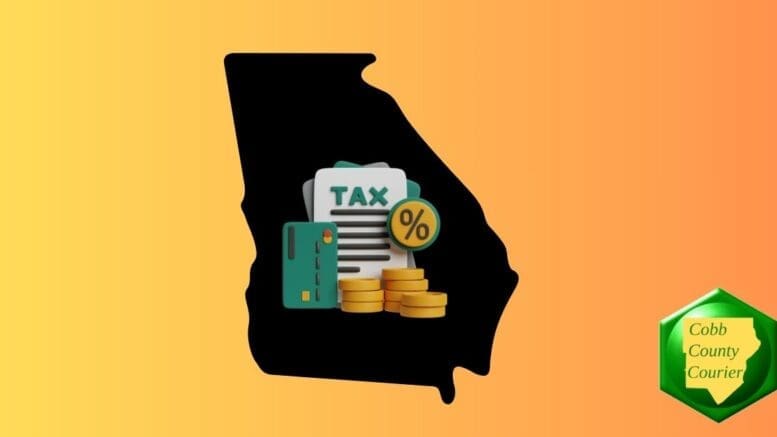This is the second of a four-part series about changes to Georgia’s property tax laws that will go into effect January 1, 2025. Follow this link to read part one. Part one gave a general description of the law. This article will focus on what the county and cities within the county that want to opt out have to do before the March 1 deadline.
Cobb County and the cities within the county have two major decisions to make regarding the new Georgia tax law created by the passage of House Bill 581 and the voters’ approval of Amendment 1 in November.
And there is a very tight window for making those decisions.
The county and cities must decide whether to opt out of the floating homestead exemption and whether to levy a new local option sales tax (the FLOST) for property tax relief.
Cobb Chief Tax Assessor Stephen White and Dante Handel, the Associate Director of Governmental Affairs for the Association County Commissioners of Georgia, recently gave a presentation and answered questions posed by local officials from Cobb’s county and city governments.
The information for this article is from that presentation plus supporting documents linked at the bottom of this article.
Follow this link to a video of their presentation.
As of January 1, 2025, counties, cities, and school boards are all automatically covered by the new law with its floating homestead exemption.
According to a presentation from the Association County Commissioners of Georgia (ACCG) and the Georgia Municipal Association:
- Any governing authority may elect to opt out of the floating homestead exemption created by HB 581 by following a procedure like the “public notification of tax increase” when a full rollback is not taken.
- Each local government must advertise and conduct three public hearings if it intends to opt out and later adopt a resolution.
- It must then file the resolution to the Georgia Secretary of State by March 1, 2025. If the above procedures are not followed, the opt out is not effective.
- Important to note: The decision to opt out is independent among local governments
- A county, the cities, and the school board may each decide whether to opt out.
- The decision of whether or not to opt out will not impact the other local government’s homestead exemption
- This may result in homes having different taxable values
The FLOST
The legislation includes a new local option sales tax intended to offer further property tax relief and offset revenue lost from the governing bodies affected by HB 581.
Dante Handel of the ACCG described the new FLOST:
“The way that property tax relief is shown is in two ways,” Handel said. “Whatever is collected in the FLOST in the year before gets converted to a millage equivalent, and then your annual rollback rate is reduced by that millage equivalent.”
Handel said that the thinking of the legislature was that the floating homestead exemption shifted some of the tax burden to other property types (properties in which the owner doesn’t live on the premises). A FLOST could reduce the overall millage rate, and alleviate some of that burden.
The FLOST could be up to one percent, although it could be any amount in .05 percent increments up to a percent.
To implement the FLOST, an intergovernmental agreement must be reached between the county and cities representing more than 50 percent of the county.
Once that agreement is signed, a countywide referendum would be held. If it passed, the sales tax would be collected and distributed in accordance with the intergovernmental agreement.
To be eligible to levy the FLOST, both the county and all cities within the
county that levy a property tax, must have a floating homestead exemption, either the one created by HB 581 bill or a local
floating homestead exemption.
The school board is not part of the intergovernmental agreement, and the county’s ability to implement a FLOST isn’t contingent on whether the school board has a floating homestead exemption.
According to a Frequently Asked Question sheet from the ACCG and the Georgia Municipal Association (GMA):
Schools generally cannot receive revenues from sales taxes other than those authorized by the Constitution (ESPLOST) and certain existing Local Constitutional Amendments (ELOSTs), so it would require such a constitutional amendment specifically authorizing or requiring that school
districts receive a share in the FLOST.
The county and all the cities except Austell and Mableton already have a floating homestead exemption.
Austell doesn’t have one in place, even though it has a millage rate, and Mableton doesn’t have one because it has no millage rate.
In a practical sense this means for Cobb County that if Austell opts out of the floating homestead exemption, and doesn’t put an equivalent local one in place, a FLOST can’t be implemented.
For further information
Ballotpedia ran a description of HB 581, and the November referendum results that enabled it.
You can read HB 581 as it was passed by the House and Senate and signed into law here.
Although the bill is complex, before the general election, Decaturish published an informative article on the intent and nuts and bolts of the law.
The Association of County Commissioners of Georgia and the Georgia Municipal Association ran a Frequently Asked Questions (FAQ) sheet explaining Georgia HB 581.
